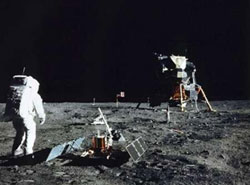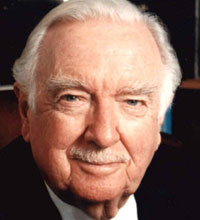 40 years ago this Monday, my neighbor, Neil Armstrong, walked on the moon. I’m not sure which is more unbelievable to me: the fact that it happened, or the fact that he and I now have mutual friends (I’ve never met him). It was, truly, an emotional moment for our country!
40 years ago this Monday, my neighbor, Neil Armstrong, walked on the moon. I’m not sure which is more unbelievable to me: the fact that it happened, or the fact that he and I now have mutual friends (I’ve never met him). It was, truly, an emotional moment for our country!
For the first time ever, a human being stepped onto the surface of a piece of land not on earth. Neil Armstrong was the moon’s first E.T., and Buzz Aldrin was second. Most of America–and the world–watched live. I watched as Walter Cronkite momentarily lost his journalistic bravado and got weepy. Wally Schirra, an astronaut on the air to provide color commentary, was equally speechless. And the nation beamed with pride during an achievement that began in politics, was achieved through vision, science and faith, and was completed with some saavy astronauts piloting through computer errors and nearly a loss of fuel to complete their victorious journey on the most public stage the world had ever seen.
It was September 12, 1962, when John F. Kennedy went before a crowd at Rice University in Houston, Texas, and announced publically the following: “We choose to go to the moon in this decade and do the other things, not because they are easy, but because they are hard, because that goal will serve to organize and measure the best of our energies and skills, because that challenge is one that we are willing to accept, one we are unwilling to postpone, and one which we intend to win, and the others, too.” His speech was not only visionary but also realistically practical, as he acknowledged the cost and the long odds and made a case for why we needed to go anyway. (Read the complete speech.)
The enormity of that vision statement has been largely lost in history, so I’m glad it is remembered today. At that time, we were so far behind the Russians in the space race–we had a grand total of 15 minutes experience in space. We didn’t have the thrust to launch a rocket to the moon. We didn’t have the guidance system to aim for the moon and hit it. And we didn’t have the communication ability to talk to our guys while they were out there. While the Russians had orbited the Sputnik satellite and sent the first man (Yuri Gregarin) into orbit, the United States had sent only Alan Shepherd straight up and straight down from Florida into the Atlantic Ocean. But researchers under the direction of Vice-President Lyndon Johnson had determined that while we couldn’t catch up to the Russians in near-earth technology, we could challenge them to a moon race where we’d be starting on at least even terms with them.
And seven years later, on the wings of the efforts of tens of thousands of American workers and hundreds of thousands of their prayers, we landed on the moon. Neil Armstrong took the first steps, but there was a strong sense that “we” did it. And then Mr. Armstrong took the mantle of what had begun politically and proclaimed the first step “for all mankind.” How classy! What a time it was.
I’m glad we have a tradition of commemorating the times when our past was brilliant. We came oh so close to not even attempting the moon landing, and within seconds of not making it. Oh, where will we go next? If you’re interested, USA Today has a nice discussion of that question in today’s editions and online.
In the meantime, I’ll celebrate what we did, and take my kids to nasa.gov and share the story with them in the video language they can relate to. And I’ll invite them to plan for the kind of dreams that are the most fulfilling: the ones that once seemed impossible but come true in the end.
Here’s to the moon landing, and whatever’s next for us, as individuals, as a culture, and as a country.


